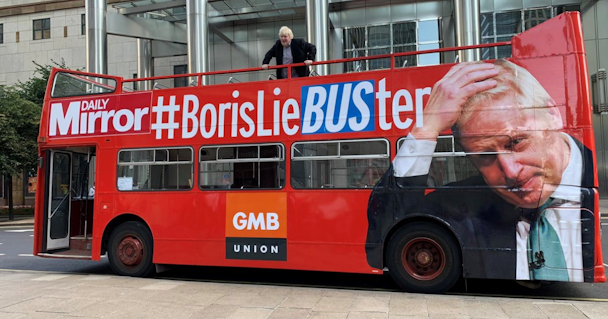Are brands more accountable than politicians?
There was a time in the not too distant past when brands and politicians lived very different lives. Politicians were constantly under the gaze of the media, scrutinized in parliament and held accountable by the electorate. A link to an iffy donor or a frisson with a secretary could be enough to end your political career in a heartbeat.

Underdog Sports Marketing on whether the tables have turned for brands and politicians - and who is the more trustworthy. / The Daily Mirror
Big brands on the other hand could cover a multitude of sins. Regardless of how unscrupulous your business was, the slick ad men of Madison Avenue or Soho could create you a campaign that painted a much rosier picture. A warm, cuddly brand image that meant your average consumer was happy to part with their cash regardless of what the reality was.
But as Britain heads to the polls, have these roles been reversed? Boris Johnson’s campaign has faced claims of financial misconduct (Arcuri affair) and he’s repeatedly dodged scrutiny by not appearing on high profile TV debates. Yet despite this, plus a history of writing articles using homophobic, Islamaphobic and sexist language, not to mention the spurious claims of a certain red bus, he’s still favourite to become Prime Minister.
Meanwhile, in 2019, in the brand world, one slip can land you in serious hot bother. Consumers are quick to point out a brand’s flaws. You can’t simply tell people what to think anymore. When Gillette tried to champion positive masculinity they got both barrels from the public. Just last week, cycling-tech company Peloton had £1bn wiped off their valuation in the wake of an ill-judged, sexist and somewhat dystopian advert. Even Nike, whose marketing is best in class faced backlash this year in the wake of the Alberto Salazar scandal. Ultimately they closed the Nike Oregon Project, their elite athlete training programme, the ultimate in ‘owned media.’
With three elections and one generation-defining referendum in four years, it might seem like we’re constantly voting in the UK. In the brand world, the equivalent of the electorate, consumers are actually constantly voting. Either with their bank accounts or with their thumbs on social media. The cancel-culture we live in means that negative news stories are quick to spread online. While political figures have dyed in the wool, fanatical support based, consumers are much more likely to behave like floating voters towards brands. There is much more choice for consumers than there is in politics and as a brand you’re held to account much more regularly.
It’d be impossible to scratch the surface of this subject without exploring the biggest brand in 21st century politics. Donald J. Trump. In 2016, Trump overcame allegations of sexual misconduct, inciting violence and repeated use of racist rhetoric to become President. Virtually every week of his Presidency, Trump has faced some kind of controversy, often his own making and has managed to ride them all out so far. His default tactics of shouting ‘fake news’, blaming the elite and discrediting his detractors have been enough to survive so far...even if he is facing an impeachment hearing. So should brands be learning from this? Should Pepsi call Coke losers? Maybe Starbucks could launch a range of “covfefe.”
Should they simply whether the storm, stop trying to be everyone’s friend and embrace the post-truth world?
I’d argue no. To try and impose opinions on the public rather than earning the brand affinity is the advertising of old. For whatever reason, politics and marketing seem to have swapped roles. Now is the time to get your house in order, if you want your electorate to love you then you have to practice what you preach.
Ged Colleypriest, founder of Underdog Sports Marketing.
Content by The Drum Network member:

Underdog Sports Marketing
Are you looking to market your brand or product to sports fans? Underdog Sports Marketing is here to help. We are experts in social media, video content and fans....
Find out more